Chimpanzee
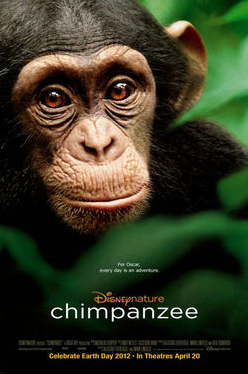
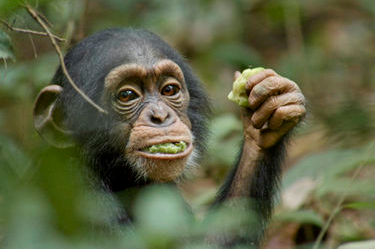 In a way, this is both a blessing and a curse. I'm sure this approach is certainly more kid friendly, and helps the smaller members of the audience identify with with the animals up on the screen. On the other hand, it cheapens what could have been a much more powerful documentary. Chimpanzee is pretty much what you would expect from a DisneyNature film. It's beautifully filmed, and has a couple amazing facts about the creatures scattered about. (Did you know that Chimpanzees eat monkeys?) But the filmmakers' attempts to humanize the subject matter through a comical and G-rated narration by Tim Allen kind of works against it. I'm still recommending it, because there is some absolutely unbelievable footage here. It's also sure to be a big hit with families. I just wish the studio would take these nature documentaries a little more seriously.
In a way, this is both a blessing and a curse. I'm sure this approach is certainly more kid friendly, and helps the smaller members of the audience identify with with the animals up on the screen. On the other hand, it cheapens what could have been a much more powerful documentary. Chimpanzee is pretty much what you would expect from a DisneyNature film. It's beautifully filmed, and has a couple amazing facts about the creatures scattered about. (Did you know that Chimpanzees eat monkeys?) But the filmmakers' attempts to humanize the subject matter through a comical and G-rated narration by Tim Allen kind of works against it. I'm still recommending it, because there is some absolutely unbelievable footage here. It's also sure to be a big hit with families. I just wish the studio would take these nature documentaries a little more seriously.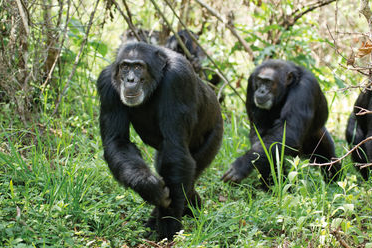 What we get in Chimpanzee is a central plot that has been manipulated and strung together by the editors and narration-writers. It follows "Oscar", a baby chimp who loses his mother when a rival packs of chimps (led by the film's "villain", whom the filmmakers have dubbed "Scar") causes them to get separated. Little Oscar gets reunited with his group quickly enough, but his mother never returns. (The sugar-coated narration tells us just enough to let us know that she was killed by a predator.) Now alone in the world, Oscar has to try to live on his own, as the others in the group reject him. It is heartbreaking seeing the little guy growing thin and weak due to lack of food and nourishment. But then, surprisingly, Oscar is taken under the wing of the group's alpha male, "Freddy", who begins to raise and care for him.
What we get in Chimpanzee is a central plot that has been manipulated and strung together by the editors and narration-writers. It follows "Oscar", a baby chimp who loses his mother when a rival packs of chimps (led by the film's "villain", whom the filmmakers have dubbed "Scar") causes them to get separated. Little Oscar gets reunited with his group quickly enough, but his mother never returns. (The sugar-coated narration tells us just enough to let us know that she was killed by a predator.) Now alone in the world, Oscar has to try to live on his own, as the others in the group reject him. It is heartbreaking seeing the little guy growing thin and weak due to lack of food and nourishment. But then, surprisingly, Oscar is taken under the wing of the group's alpha male, "Freddy", who begins to raise and care for him.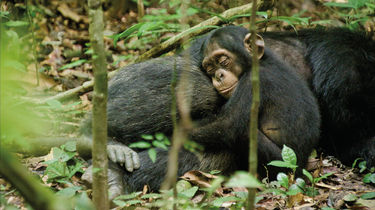 Pretty much all the rough edges and harsh realities of living in a dangerous and predator-filled rain forest have been sanded away, so that the story of little Oscar can follow a fairly predictable Disney formula of an orphaned youth overcoming the odds. In a day and age where kids can turn on Animal Planet, and see much harsher (and accurate) documentaries of animal life, this seems more than a little cloying. Still, there's no denying that directors Alastair Fothergill and Mark Linfield have captured some stunning nature scenery, as well as gotten us closer to a chimp's society than we could have ever dreamed. In fact, the best part of the movie is the end credits, and I mean that without a hint of irony. That's when we get to see some behind the scenes footage of how the filmmakers got some of these shots, and the hardships they had to go through, such as getting stung by bees.
Pretty much all the rough edges and harsh realities of living in a dangerous and predator-filled rain forest have been sanded away, so that the story of little Oscar can follow a fairly predictable Disney formula of an orphaned youth overcoming the odds. In a day and age where kids can turn on Animal Planet, and see much harsher (and accurate) documentaries of animal life, this seems more than a little cloying. Still, there's no denying that directors Alastair Fothergill and Mark Linfield have captured some stunning nature scenery, as well as gotten us closer to a chimp's society than we could have ever dreamed. In fact, the best part of the movie is the end credits, and I mean that without a hint of irony. That's when we get to see some behind the scenes footage of how the filmmakers got some of these shots, and the hardships they had to go through, such as getting stung by bees.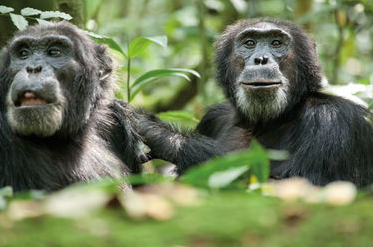 Outside of the up close and intimate look at the chimps themselves, we also get some wonderful shots of the world around them, including time lapse photography of vines crawling up a tree, or a spider spinning its web. This kind of stuff is worth the price of admission alone, and is probably why I preferred the earlier DisneyNature films, which was mainly about the world around us. Without the anthropomorphized animals and the Tim Allen narration, this probably could have been stunning. Still, even with the filmmakers' constant manipulations, the chimps themselves do make a fascinating subject matter, and their expressive faces tell their story better than the narrator ever possibly could.
Outside of the up close and intimate look at the chimps themselves, we also get some wonderful shots of the world around them, including time lapse photography of vines crawling up a tree, or a spider spinning its web. This kind of stuff is worth the price of admission alone, and is probably why I preferred the earlier DisneyNature films, which was mainly about the world around us. Without the anthropomorphized animals and the Tim Allen narration, this probably could have been stunning. Still, even with the filmmakers' constant manipulations, the chimps themselves do make a fascinating subject matter, and their expressive faces tell their story better than the narrator ever possibly could.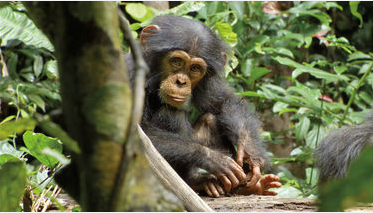
See the movie times in your area or buy the DVD at Amazon.com!






0 Comments:
Post a Comment
<< Home